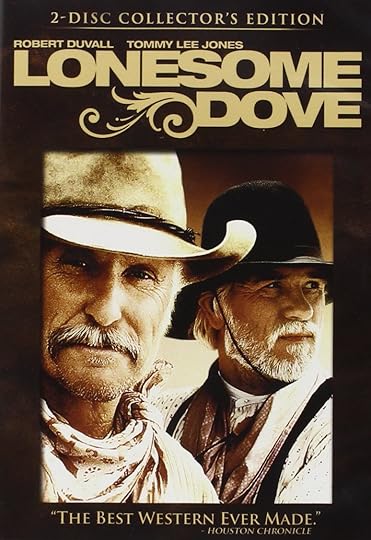Pondering the Pulitzer – Part 1 – Westerns!
I recently finished all of the Pulitzers and will write a few posts about some of my favorites, my least favorites, and other lists and whatnot. Being that the Pulitzer was originally intended to be about the American way of life, nothing is more American than the Western literary genre. For my first list, how about a Top 10 of Westerns in the Pulitzer winners column:
1. Lonesome Dove – Larry McMurtry (1986)
An absolute masterpiece with wonderful protagonists Gus and Call, a Homeric quest across the West from Texas to Montana, encounters with Indians…just all around one of the greatest westerns I have ever read. Gus and Call are two of the most unforgettable best friends in US literature. Of course, it would not pass muster in terms of woke or political correctness, but then what western would?
Pro Tip: Check out the TV miniseries with Robert Duvall as the lovable Gus and Tommy Lee Jones as the unperturbable Call. Fantastic!
2. Grapes of Wrath – John Steinbeck (1940)
This Dust Bowl classic takes the Joad family away from the nightmarish grey Oklahoma plains to the fabled California Dream which turns out to be anything but hopeful. Various voices are used to describe the journey (in the vein of John Dos Passos USA trilogy) and there are also the many wonderful speeches of Tom Joad and his special brand of deism. A truly magnificent read.
Pro Tip: The John Ford film with Henri Fonda as Tom Joad is one of Hollywood’s finest moments.
Pro Tip 2: Sometimes you get unlucky: Sanora Babb wrote her Dust Bowl epic Whose Names are Unknown at the same time as Steinbeck – the two most likely crossed paths and shared some notes during their research of the period – but Steinbeck beat her to the press. The publishers on Madison Ave decided that the public could only deal with one Dust Bowl story at a time and that sales of Grapes of Wrath would be hurt by another book on the same subject, so, sadly, Babb’s book was shelved. Babb got blacklisted in the 50s in the early days of the McCarthy witchhunts and the book did not get published until 2004, a year before she died in 2005. It is less visceral than Grapes, but takes a longer time than Grapes to tell the story of how things fell apart in Oklahoma – something Babb herself lived through. Worth seeking out on the Kindle.
3. The Travels of Jaimie McPheeters – Robert Lewis Taylor (1959)Sort of a far more visceral Huck Finn approach to a western, we follow our young protagonist along the Oregon Trail to the gold mines of California. A real delight but hard to find.
Pro Tip: I used archive.org for the out-of-print books on the list.
4. Now in November – Josephine Winslow Johnson (1935)
This forgotten book was a debut novel for Johnson and a beautiful invocation of life in Oregon during the famines of the 1930s. Beautifully written, it describes the difficult life of four daughters.
Pro Tip: After writing Now in November, Johnson wrote primarily poetry and short stories, for the latter of which she won O’Henry Prize 5 times.
Pro Top 2: This was the 3rd debut novel to win the Pulitzer after The Able McLaughlins (1924) – more on that one in a minute – and Years of Grace (1931) by Margaret Ayer Barnes.
5. One of Ours – Willa Cather (1923)
Cather is always a fun read. Her books bathe in a cultural smorgasbord on the midwestern frontier near Nebraska for the most part people with first-generation Germans, Norwegians, and Swedes – the environment in which Willa herself grew up. During this book, we spend half of the time with Claude in his frustrating marriage on the farm in Nebraska and then follow him to the brutal battlefields of France in 1918. In act, the structure kind of reminded me of Stanley Kubrick’s story structure in “Full Metal Jacket”.
Pro Tip: If you like this one, check out some of her other amazing books such as O Pioneers!, My Ántonia, and (admittedly still on my TBR) Death Comes for the Archbishop. Note to self: maybe do a post about Catholic books on the Pulitzer list – there were loads actually!
6. The Town – Conrad Richter (1951)
Conrad Richter wrote The Awakening Land trilogy starting with The Trees in 1940 and The Fields in 1946 (I read the former, skipped the latter), and finished it with this award-winner. It covers the life of his protagonist Sayward Wheeler and her family on the Ohio Valley frontier from the 1820s to the 1860s. It was a tough life and well-described here by Richter. It was particularly interesting to see the world transform from its “pioneer” state to a more modern civilized state with the removal of the forest and the arrival of the telegraph and the train.
Pro Tip: Actually, he nearly won the Prize for the first book in the trilogy which I actually enjoyed more than this one.
7. The Way West – A.B. Guthrie (1950)
This is also part of a series of books, The Big Sky which consists of a total of 6 books. I read the first volume – the eponymous Big Sky – and this award winner. In this book, we have another wagon train along the Oregon Trail with a crazy host of characters. It was interesting to compare the experiences in this book to those of Jaimie McPheeters.
Pro Tip: I preferred the first novel due to the epic protagonists, only one of which is present in The Way West.
Pro Tip 2: This book is one of the least politically correct on this list so caveat emptor.
8. Honey in the Horn – Harold L. Davis (1936)
The third book on this list that deals with Oregon, this one takes place between the Oregon Trail and the Dustbowl from 1906-1908. This one takes place in the wild coastal regions with a strange love triangle and some less than amazing adventures.
Pro Tip: I wasn’t sold on this one and feel that Sinclair Lewis’ It Can’t Happen Here was a more worthy book – certainly it had a longer shelflife!
9. The Able McLaughlins – Margaret Wilson (1924)I wasn’t enamored with this book about Iowa during the Civil War. There was another love triangle here like in the previous book, and it just withered on the vine for me.
Pro Tip: This was the first debut novel to win the Pulitzer and the represents with the following year, the only moment when there was the same number (3 in 1924) or more (4 in 1925) women laureates than men.
10. Laughing Boy – Olivier La Farge (1930)
This one comes dead last for me (and very low on the over the list of 101 books that won the PP) because it felt so condescending towards Amerindians. In 1915, cars arrive in the Navajo nation and change will not be happy. Yes, there is some valuable description of the lives of the Navajo, but the protagonists all never evolve intellectually beyond adolescence. They never become fully well-rounded.
Pro Tip: There is one saving grace which is that La Farge does point out the damage wrought on the Native communities by government schools. A topic that Louise Erdrich and Sherman Alexie talk about in their more contemporary books.




